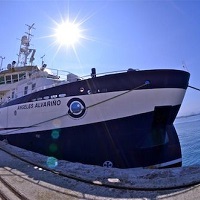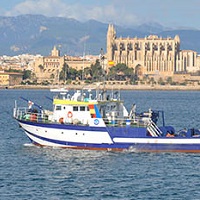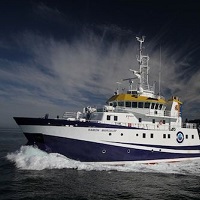Keyword
Bacteria taxonomic abundance in water bodies
50 record(s)
Type of resources
Categories
Topics
INSPIRE themes
Keywords
Contact for the resource
Provided by
Years
Formats
Status
-

The goals of this campaign are framed within the objectives of the overall project 'Radial Profunda de Canarias', being the experimental cruise of the proposal. Thus, this cruise will help to: • Determine the structure of the current when it reaches the Canary Islands, of the Outcrop Current and the polar counterflow of slope in its passage through the Canary Archipelago and the African slope, stimating its mass transport, heat and nutrients. • Characterize the different modes of variability of heat and mass transport in easternorth atlantic subtropical gyre and the oucrop in northwest African coast. • Characterize the annual cycle in the physical conditions of the surface layers and mixture to where the seasonal cycle is significant, relating it to the meteorological forcings. • Characterization of changes in water masses, mainly in the North Atlantic Central Water (NACW), in Antarctic Atlantic Intermediate Water (AAIW) in Mediterranean Water (MW), bottom waters of the Canary Basin and the oucrop in northwest African coast, in based on temperature, salinity, nutrients and oxygen. • To characterize the zooplancton and micronecton deep communities. • To charactereze the microbian and heterotrophic communities.
-

The general objective of SponGES 0617 expedition on board R/V Angeles Alvariño (IEO) was the study of sponge grounds in the Aviles Canyon System and Le Danois Bank (Study cases of SponGES project nº 4 and 5) where we had knowledge of their existence in the previous projects of IEO in the area (ECOMARG, INDEMARES, ESMAREC), in order to complete the objectives of SponGES project. Specific objectives: 1. Sampling of the structuring sponge species for both anatomical and morphological description and their identification through molecular tools. 2. Collection of samples that will be part of the reference collections, for the sponge grounds species and of the associated fauna. 3. Study of the associated fauna in areas of the target species and in nearby control areas. 4. Sampling of the microbial fauna associated with the target sponge species. 5. Investigate the microbial fauna in sea water collected by rosette and control sediments (Box Corer). 6. Transects with the Politolana ROTV for describing the habitats of structuring species using photogrammetric techniques based on qualitative and quantitative data (presence / density / abundance), as well as environmental data. 7. Sampling for reproductive ecology and genetic structure of target species.
-

EVALUACION DE LA SENSIBILIDAD DEL BUCLE MICROBIANO AL IMPACTO DE MULTIPLES FACTORES EN ECOSISTEMAS ACUATICOS MEDITERRANEOS OBJETIVOS: De acuerdo con los planteados en el proyecto Microsens, los objetivos de la campaña serán los siguientes: 1. Cuantificar la biodiversidad de la comunidad planctónica, mediante la determinación de: 1.1 La abundancia y biomasa de bacterias y picoplancton autótrofo 1.2. La composición taxonómica, abundancia y biomasa de fitoplancton 1.3. La composición taxonómica, abundancia y biomasa de nanoflagelados y ciliados. 1.4. La composición taxonómica, abundancia y biomasa de micro y macrozooplancton. 2. Cuantificar el flujo de carbono entre los distintos grupos funcionales que constituyen el bucle microbiano y la cadena de consumidores, para lo cual se llevarán a cabo medidas de la producción primaria y respiración en diferentes fracciones del plancton 3. Determinar las respuestas funcionales y metabólicas de la comunidad planctónica ante cambios en el espectro de radiación solar y en la concentración de nutrientes mediante experimentos de micro-cosmos realizados a bordo.
-

The goals of this campaign are framed within the objectives of the overall project 'Radial Profunda de Canarias', being the experimental cruise of the proposal. Thus, this cruise will help to: • Determine the structure of the current when it reaches the Canary Islands, of the Outcrop Current and the polar counterflow of slope in its passage through the Canary Archipelago and the African slope, stimating its mass transport, heat and nutrients. • Characterize the different modes of variability of heat and mass transport in easternorth atlantic subtropical gyre and the oucrop in northwest African coast. • Characterize the annual cycle in the physical conditions of the surface layers and mixture to where the seasonal cycle is significant, relating it to the meteorological forcings. • Characterization of changes in water masses, mainly in the North Atlantic Central Water (NACW), in Antarctic Atlantic Intermediate Water (AAIW) in Mediterranean Water (MW), bottom waters of the Canary Basin and the oucrop in northwest African coast, in based on temperature, salinity, nutrients and oxygen. • To characterize the zooplancton and micronecton deep communities. • To charactereze the microbian and heterotrophic communities.
-

The objective of the project RADIALES, formulated in 1990, aims at “understanding and modelling the response of the marine ecosystem to the sources of temporal variability in oceanographic and planktonic components, particularly foccusing in those factors and processes affecting biological production and potentially altering the ecosystem services”. This project represents the oldest multidisciplinary ocean observation initiative still active in Spain.
-

The objective of the project RADIALES, formulated in 1990, aims at “understanding and modelling the response of the marine ecosystem to the sources of temporal variability in oceanographic and planktonic components, particularly foccusing in those factors and processes affecting biological production and potentially altering the ecosystem services”. This project represents the oldest multidisciplinary ocean observation initiative still active in Spain.
-

The objective of the project RADIALES, formulated in 1990, aims at “understanding and modelling the response of the marine ecosystem to the sources of temporal variability in oceanographic and planktonic components, particularly foccusing in those factors and processes affecting biological production and potentially altering the ecosystem services”. This project represents the oldest multidisciplinary ocean observation initiative still active in Spain.
-

The objective of the project RADIALES, formulated in 1990, aims at “understanding and modelling the response of the marine ecosystem to the sources of temporal variability in oceanographic and planktonic components, particularly foccusing in those factors and processes affecting biological production and potentially altering the ecosystem services”. This project represents the oldest multidisciplinary ocean observation initiative still active in Spain.
-

The objective of the project RADIALES, formulated in 1990, aims at “understanding and modelling the response of the marine ecosystem to the sources of temporal variability in oceanographic and planktonic components, particularly foccusing in those factors and processes affecting biological production and potentially altering the ecosystem services”. This project represents the oldest multidisciplinary ocean observation initiative still active in Spain.
-

The objective of the project RADIALES, formulated in 1990, aims at “understanding and modelling the response of the marine ecosystem to the sources of temporal variability in oceanographic and planktonic components, particularly foccusing in those factors and processes affecting biological production and potentially altering the ecosystem services”. This project represents the oldest multidisciplinary ocean observation initiative still active in Spain.
 Catálogo de datos del IEO
Catálogo de datos del IEO